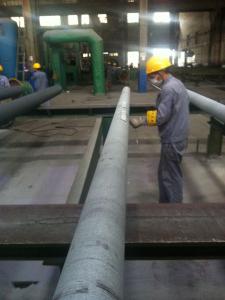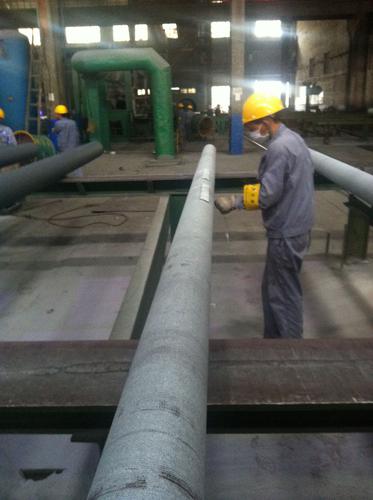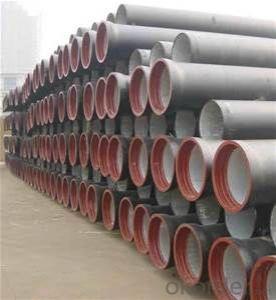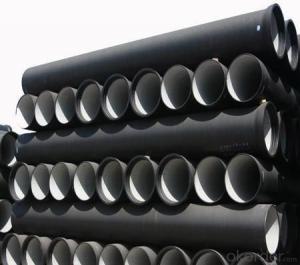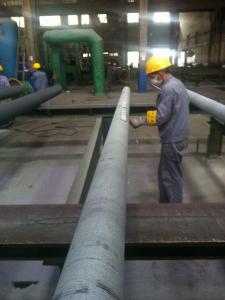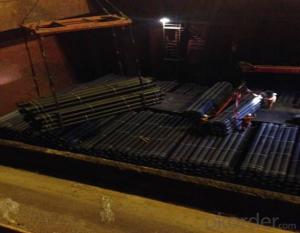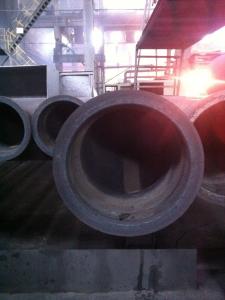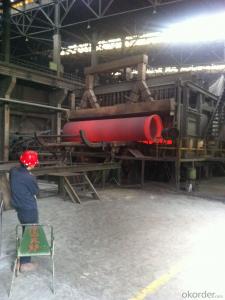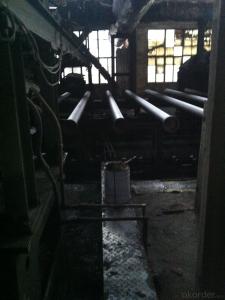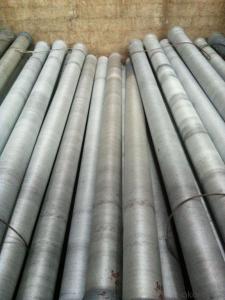DUCTILE IRON PIPES AND PIPE FITTINGS K9 CLASS DN700
- Loading Port:
- Tianjin
- Payment Terms:
- TT OR LC
- Min Order Qty:
- 22 pc
- Supply Capability:
- 3000 pc/month
OKorder Service Pledge
OKorder Financial Service
You Might Also Like
Material : Ductile Cast Iron
Size Range : DN 80mm to DN 2000mm
Unit Effective Length : 6m or 5.7m
Manufacture Standard: ISO 2531:1998/ EN 545:2006/EN 598:2007
Annual capacity : 200,000 tons
Coating Exterior: Zinc 130g/m2 according to ISO 8179-1 and bitumen coating 70 microns.
Cement Interior: Portland Cement/ High Alumina Cement/ Sulphate Resisting Cement Lining according to ISO 4179
Special requirements on external coating and internal lining can be applied
We also provide accessories such as SBR/EPDM rubber gaskets, lubricant paste, pipe caps, PE sleeves, etc.
Additional Parts:
Each pipe is strictly inspected according to related standard to ensure permanently high performance.
Easy Installation at site and service free for life
Long Service Lifespan
Quotation will arrive you within 24hours once we get your inquiry.
We guarantee offering you a competitive price.
A copy of original inspection reports of pipes will be offered after shipment.
Photos of loading process will be sent to the customer after shipment effect.
We will follow-up the delivery progress after shipment effect and update to the customer on weekly basis.
- Q: Ductile iron pipe joint damage, water leakage, want to see the connection with other pipe fittings, how to operate?!
- The ink tube is really not good. Oh, have you tried blocking it with cement or plugging it with putty?Just pick up PE haha
- Q: Are ductile iron pipes suitable for use in desalination plants?
- Ductile iron pipes are indeed suitable for use in desalination plants. Desalination plants are facilities that remove salt and other impurities from seawater, turning it into fresh water for consumption or industrial use. These plants require a reliable and durable piping system to transport the treated water to various destinations. Ductile iron pipes are known for their strength, flexibility, and corrosion resistance, making them an ideal choice for desalination plants. These pipes are made from a form of cast iron that has been treated with magnesium to enhance its properties. This treatment gives ductile iron pipes a high tensile strength, allowing them to withstand the high pressures associated with the desalination process. Additionally, desalination plants often use chemicals and other treatment methods to remove impurities from the water. Ductile iron pipes have excellent resistance to corrosion from these chemicals and can withstand the harsh conditions found in desalination plants without deteriorating over time. This ensures the longevity and reliability of the piping system, minimizing the risk of leaks or failures. Furthermore, ductile iron pipes have a smooth internal surface, which helps to minimize friction and pressure loss as water flows through the pipes. This feature is especially important in desalination plants, where efficiency is crucial for the overall operation of the facility. The smoothness of ductile iron pipes allows for efficient water flow, reducing energy consumption and optimizing the desalination process. In conclusion, ductile iron pipes are suitable for use in desalination plants due to their strength, flexibility, corrosion resistance, and smooth internal surface. These pipes provide a reliable and durable piping system that can withstand the high pressures, harsh chemicals, and demanding conditions found in desalination plants.
- Q: What is the expected hydraulic efficiency of ductile iron pipes?
- The expected hydraulic efficiency of ductile iron pipes is generally high, as they have a smooth interior surface that minimizes friction and allows for efficient flow of water or other fluids.
- Q: What is the use of ductile iron?
- Ductile iron is used as a conduit at the beginning. Iron pipes and fittings are mostly produced by major industrial countries. Their manufacture, design and use are in line with national standards and international standards and procedures (I502531). As far as water and other liquids are concerned, it has long been proved that ductile iron pipes are superior to gray iron pipes. The main reason for this change is the combination of strength and toughness of Ferritic Ductile Iron, which makes the pipes made of this material subject to high operating pressures and can be readily loaded and laid during laying. A gas pipeline must be able to withstand multiple use requirements, which stand near the pipeline excavation and municipal engineering construction and transportation, where the ball iron pipes with high strength, high performance and simple installation and connection technology has proved that this material selection is decisive.
- Q: How is ductile iron different from cast iron?
- Ductile iron and cast iron are two iron alloys with varying compositions, properties, and uses. The primary distinction between the two lies in their microstructure and mechanical properties. Ductile iron, also known as spheroidal graphite iron or nodular cast iron, is a type of cast iron that undergoes an extra treatment process to enhance its strength and ductility. This is achieved by adding small amounts of magnesium to the molten iron during casting, resulting in the formation of graphite nodules throughout the material. These nodules act as stress raisers, preventing crack propagation and making ductile iron more resistant to fractures and more flexible compared to cast iron. In contrast, cast iron is an iron alloy with a higher carbon content than ductile iron. This higher carbon content leads to the formation of graphite flakes within the material, giving cast iron its characteristic brittleness. Due to its brittleness, cast iron is more prone to cracking and less flexible than ductile iron. However, cast iron exhibits excellent compressive strength and is highly resistant to wear and abrasion, making it suitable for applications where strength and durability are crucial, such as engine blocks, pipes, and manhole covers. Another difference between ductile iron and cast iron can be observed in their machinability. Ductile iron is generally easier to machine due to its lower carbon content and the presence of graphite nodules, which act as lubricants during the cutting process. On the other hand, the presence of graphite flakes in cast iron can cause tool wear and result in a poor surface finish during machining. In summary, ductile iron and cast iron differ in their microstructure, mechanical properties, and applications. Ductile iron offers improved ductility and fracture resistance, making it suitable for applications that require flexibility and impact resistance. Cast iron, with its higher carbon content and graphite flakes, provides excellent compressive strength and wear resistance, making it ideal for applications that demand strength and durability.
- Q: Can ductile iron pipe be used for marine and offshore applications?
- Yes, ductile iron pipe can be used for marine and offshore applications. Ductile iron is known for its high strength and durability, making it suitable for various environments, including those with exposure to saltwater and harsh conditions. It is commonly used in marine and offshore projects due to its resistance to corrosion, impact, and pressure. Additionally, ductile iron pipes have proven to be cost-effective and reliable for transporting fluids in these challenging environments.
- Q: Are ductile iron pipes suitable for industrial applications?
- Yes, ductile iron pipes are highly suitable for industrial applications. Ductile iron is a strong and durable material that possesses excellent mechanical properties, making it ideal for handling high-pressure and heavy-duty applications. The pipes have a high tensile strength and can withstand extreme conditions, including high temperatures and corrosive environments. Furthermore, ductile iron pipes have superior resistance to cracking and fracturing, ensuring a longer lifespan and reduced maintenance costs. They are also highly resistant to external loads, making them suitable for underground installations and industrial settings where they may be subjected to heavy loads or vibrations. Moreover, ductile iron pipes have excellent flow characteristics due to their smooth interior surface, allowing for efficient fluid transportation in industrial systems. They also have good resistance to wear and abrasion, ensuring a consistent flow rate over time. Additionally, ductile iron pipes are versatile and can be used in various industrial applications such as water supply, wastewater treatment, industrial processes, and mining operations. They are available in a wide range of sizes to accommodate different requirements and can be easily connected using various jointing methods. Overall, ductile iron pipes offer the reliability, strength, and longevity required for industrial applications, making them a suitable choice for industries where durability and performance are crucial.
- Q: Can ductile iron pipe be used for agricultural irrigation systems?
- Yes, ductile iron pipe can be used for agricultural irrigation systems. Ductile iron pipe is known for its strength, durability, and corrosion resistance, making it suitable for various applications including agricultural irrigation. It can withstand high pressure and provide a reliable and long-lasting solution for transporting water in irrigation systems. Additionally, ductile iron pipe is resistant to chemicals commonly found in water sources used for irrigation, ensuring the pipe's integrity and preventing degradation over time. Its flexibility allows for easy installation and maintenance, making it a practical choice for agricultural irrigation systems.
- Q: Can ductile iron pipes be used in areas with high soil erosion?
- Ductile iron pipes, due to their inherent strength and durability, can be used in areas with high soil erosion. Ductile iron is a type of iron that has been treated with graphite nodules, which enhances its flexibility and tensile strength. This makes it highly resistant to cracking and breaking, even under extreme conditions. In areas with high soil erosion, the ground is prone to shifting and movement, which can put significant stress on underground pipes. However, ductile iron pipes have a high resistance to external loading and can withstand the pressures exerted by the surrounding soil. They have been extensively tested and proven to be reliable in such environments. Furthermore, ductile iron pipes have a long lifespan, often exceeding 100 years, which makes them a cost-effective choice for areas with high soil erosion. Their corrosion resistance and structural integrity make them suitable for installation in various soil conditions, including those prone to erosion. It is important to note that proper installation techniques, such as using suitable bedding and backfill materials, should be followed to ensure the optimal performance of ductile iron pipes in areas with high soil erosion. Additionally, regular inspection and maintenance should be conducted to identify any potential issues early on and prevent any damage caused by soil erosion. Overall, ductile iron pipes are a reliable and durable option for areas with high soil erosion, providing long-lasting and efficient water distribution and wastewater management systems.
- Q: What is the DN400 installation charge for ductile iron pipes?
- 1. hourly wage or piece wage: refers to the hourly wage and work hours or the work done by the unit price to pay individual labor remuneration.2. prize: refers to the excess labor and increase revenue of remuneration paid to individuals. Such as saving prize, labor competition prize, etc..3. subsidy: refers to compensate workers special or extra labor and other special reasons for the subsidies paid to individuals, and in order to ensure that the impact of inflation on real wages paid to individual price subsidies. Such as mobile construction allowance, special area construction allowance, high temperature (cold) operation, temporary allowance, aerial allowance and so on.
Send your message to us
DUCTILE IRON PIPES AND PIPE FITTINGS K9 CLASS DN700
- Loading Port:
- Tianjin
- Payment Terms:
- TT OR LC
- Min Order Qty:
- 22 pc
- Supply Capability:
- 3000 pc/month
OKorder Service Pledge
OKorder Financial Service
Similar products
Hot products
Hot Searches
Related keywords
